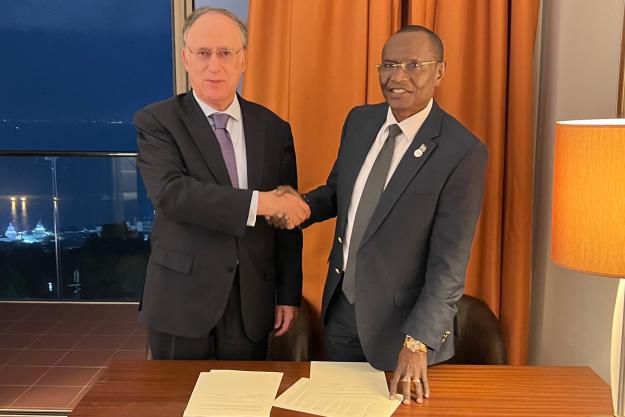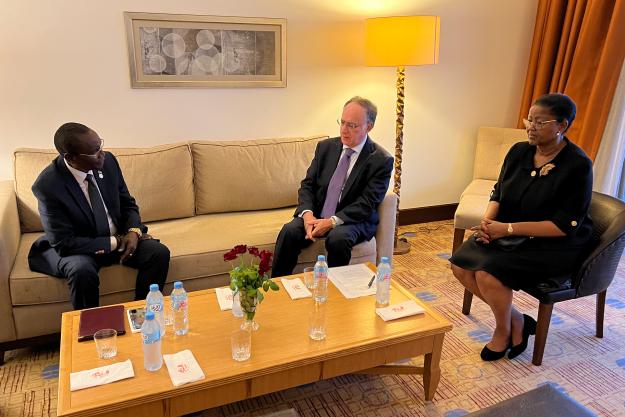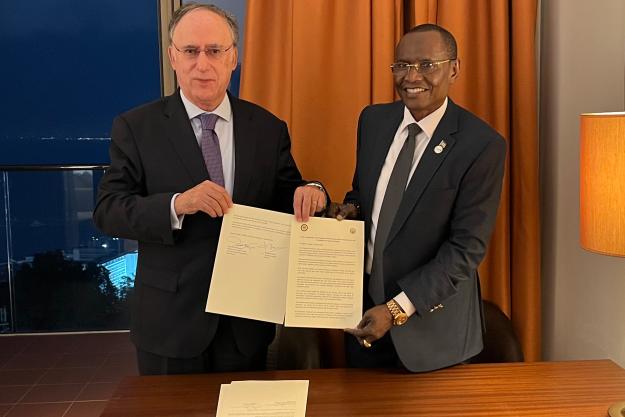
Director-General of the OPCW Ambassador Fernando Arias (left) and Minister of Foreign Affairs and International Cooperation of South Sudan, Hon. James Pitia Morgan (right)
ALGIERS, Algeria —3 October 2023— The Director-General of the Organisation for the Prohibition of Chemical Weapons (OPCW), Ambassador Fernando Arias, had a meeting with the Minister of Foreign Affairs and International Cooperation of South Sudan, Hon. James Pitia Morgan, on 3 October 2023 in the margins of CHEMEX Africa in Algiers, Algeria.
The Director-General and the Minister both emphasised the importance of upholding and strengthening the global norm against chemical weapons and discussed South Sudan’s progress towards accession to the Chemical Weapons Convention (CWC). The two high-level officials agreed to work together to complete the accession process as soon as possible.
“South Sudan is committed to the objective of a world free of chemical weapons,” the Minister said. “While South Sudan is a young, developing country with many priorities before it, we are a responsible member of the international community and accession to the Convention at an early stage remains a priority for us.”
The Director-General briefed the Minister on the ongoing work of the OPCW in preventing the re-emergence of chemical weapons, including the wide range of international cooperation programmes offered by the Organisation, such as assistance and protection related to the use or threat of use of chemical weapons.
Ambassador Arias further emphasised that universal adherence to the Convention remains a top priority for the OPCW and stated: “I commend South Sudan’s ambition to accede to the Convention at an early stage. The OPCW is ready to provide any support South Sudan may require in this endeavour.”
The Director-General and the Minister concluded the meeting by signing a joint communique. They also discussed broader issues related to global arms control, non-proliferation of weapons of mass destruction, and disarmament.
The meeting took place with financial support from the Government of Canada.

Minister of Foreign Affairs and International Cooperation of South Sudan, Hon. James Pitia Morgan (left), Director-General of the OPCW Ambassador Fernando Arias (centre), Deputy Director-General of the OPCW Odette Melono (right)

Director-General of the OPCW Ambassador Fernando Arias and Minister of Foreign Affairs and International Cooperation of South Sudan, Hon. James Pitia Morgan after signing a joint communique
Background
To date, 193 States have committed to the Chemical Weapons Convention (CWC), making it the world’s most successful international disarmament treaty for eliminating an entire category of weapons of mass destruction. Only four countries have yet to join the Convention.
Universality of the Chemical Weapons Convention underpins the achievement of a comprehensive, verifiable ban on chemical weapons. It consolidates the international norm prohibiting chemical weapons, reinforces the Convention as a confidence-building measure, prevents proliferation, and helps deny access to chemical weapons by non-State actors.
As the implementing body for the Chemical Weapons Convention, the OPCW, with its Member States, oversees the global endeavour to permanently eliminate chemical weapons. Since the Convention’s entry into force in 1997, it is the most successful disarmament treaty eliminating an entire class of weapons of mass destruction.
On 7 July 2023, the OPCW confirmed that all chemical weapons stockpiles declared by the 193 States Parties to the Chemical Weapons Convention since 1997 — totalling 72,304 metric tonnes of chemical agents — have been irreversibly destroyed under the OPCW’s strict verification regime.
For its extensive efforts in eliminating chemical weapons, the OPCW received the 2013 Nobel Peace Prize.
More Information
Achieving Universality of the Convention | OPCW
